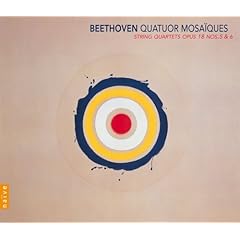Bunnyears
Headphoneus Supremus
- Joined
- Sep 13, 2004
- Posts
- 5,303
- Likes
- 19
Quote:
Hi Masolino,
Here are the timings for the Mosaïques and Emersons 18/6
I'll have to dig out the Alban Berg and Takásc later to compare times. The Gewandhaus really is an "alternative" if the tempos are that broad. However, I'm rediscovering the allure of the more leisurely paced performances. With the Emersons, at first everything was so exciting and exhilarating -- they play with breakneck speed. Eventually as the novelty of the speed palls, little things become annoying. (There is an uneven quality of the play for one thing, perhaps because they alternate the first violin part between the players.) The Takásc added dynamic play to the speed (although not, I believe, as fast as the Emersons - but perceptions can be faulty), so it was like a roller coaster -- thrilling, but also playful and fun. The Alban Berg were more mellow and balanced. I wouldn't call them easy listening, but they have that smoothness and warmth without mawkishness, which I do enjoy very much. In the notes of the booklet, it states that the Mosaïques main influence (or inspiration) was the playing of the Vegh Quartet. As I don't have that set (yet), I can't really make the comparison. I guess it's time to get out the wallet again.

| Originally Posted by Masolino /img/forum/go_quote.gif That sounds like a beautiful experience. I had something very similar a few weeks ago while listening to Wieland Kuijken's recording of Bach cello suites. His tempi tend to be so slow that it actually requires a third disc to accommodate the fifth suite (with more "normalized" gamba sonatas as fillers.) Of course it must be said that extreme tempi and rhythmic manipulations were probably more expected in solo performances (as suggested by things like fantasies, toccatas or unmeasured preludes) than in ensemble performances in the old days. What are the timings for op. 18/6 in the Mosaiques version if you have got them? They are 9:07, 6:56, 3:23, 7:52 in the Gewandhaus version. |
Hi Masolino,
Here are the timings for the Mosaïques and Emersons 18/6
Mosaïques: 7:06, 7:33, 3:21, 8:21
Emerson: 5:52, 6:52, 3:00, 8:16
Not as slow I thought, but still slower than the Emersons which I had been listening to most recently.Timings from Itunes, not booklet
I'll have to dig out the Alban Berg and Takásc later to compare times. The Gewandhaus really is an "alternative" if the tempos are that broad. However, I'm rediscovering the allure of the more leisurely paced performances. With the Emersons, at first everything was so exciting and exhilarating -- they play with breakneck speed. Eventually as the novelty of the speed palls, little things become annoying. (There is an uneven quality of the play for one thing, perhaps because they alternate the first violin part between the players.) The Takásc added dynamic play to the speed (although not, I believe, as fast as the Emersons - but perceptions can be faulty), so it was like a roller coaster -- thrilling, but also playful and fun. The Alban Berg were more mellow and balanced. I wouldn't call them easy listening, but they have that smoothness and warmth without mawkishness, which I do enjoy very much. In the notes of the booklet, it states that the Mosaïques main influence (or inspiration) was the playing of the Vegh Quartet. As I don't have that set (yet), I can't really make the comparison. I guess it's time to get out the wallet again.













